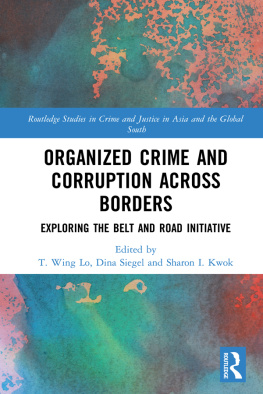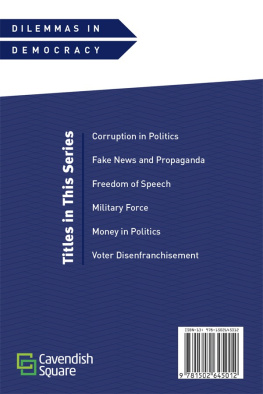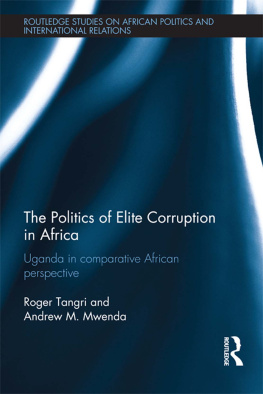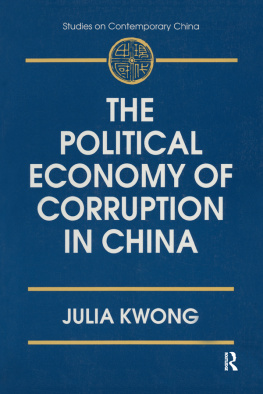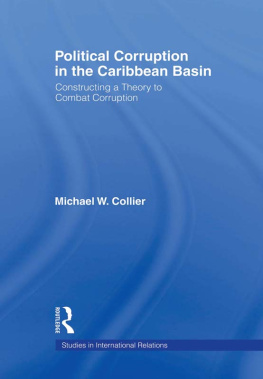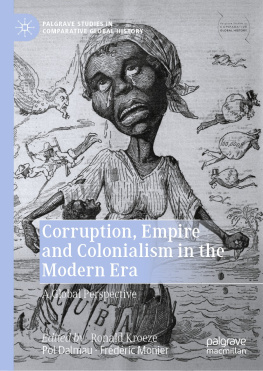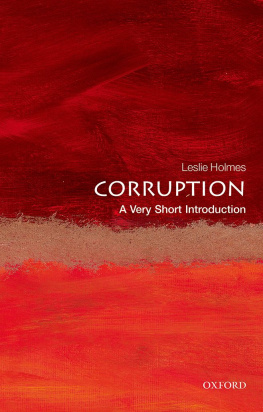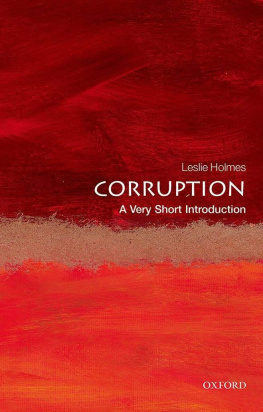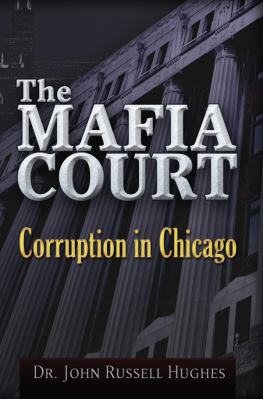Tavola dei Contenuti - "TOC"
Punti di riferimento
CORRUPTION
Carlo Alberto Brioschi
Translation by Antony Shugaar
BROOKINGS INSTITUTION PRESS
Washington, D.C.
Copyright 2017
THE BROOKINGS INSTITUTION
1775 Massachusetts Avenue, N.W., Washington, D.C. 20036
www.brookings.edu
All rights reserved. No part of this publication may be reproduced or transmitted in any form or by any means without permission in writing from the Brookings Institution Press.
This work is an adapted translation from
Il Malaffare: Breve Storia della Corruzione
Copyright 2010 Longanesi & C.
Gruppo Editoriale Mauri Spagnol
The Brookings Institution is a private nonprofit organization devoted to research, education, and publication on important issues of domestic and foreign policy. Its principal purpose is to bring the highest quality independent research and analysis to bear on current and emerging policy problems. Interpretations or conclusions in Brookings publications should be understood to be solely those of the authors.
Library of Congress Cataloging-in-Publication data are available.
ISBN 978-0-8157-2791-0
ISBN 978-0-8157-2792-7
9 8 7 6 5 4 3 2 1
Typeset in Sabon
Composition by Westchester Publishing Services
CONTENTS
INTRODUCTION
IF JULIUS CAESAR IS A THIEF
THE POLITICIANS CRAFT is commonly listed, along with prostitution, as one of the worlds oldest professions. This longevity is no doubt largely attributable to the darker aspect of the political trade, that is, the realm of corruption, whose history is as long and twisted as that of mankinds attempt to live by the rule of law. Variously tolerated or fought, depending on time and place, the very definition of corruption has shifted frequently, as practitioners of corruption have encountered the ideas, laws, and customs of different peoples. Its essence, however, has remained unchanged. We can describe that essential core, as it appears in the political and administrative sphere on which we focus in this book, as the fraudulent behavior or actions of a public official willing to take money or gifts from vested interests or any other benefits in exchange for favors performed for or granted to the benefactor in question.
Who really cares, though, whether Julius Caesar is a thief? The question isnt a new one, but it hardly seems to have lost its relevance over the centuries: Few of us remember Demosthenes or Dante Alighieri for the cases in which they were accused of malfeasance; if anything, the impression is that the corruption of great men is considered practically inevitable. Perhaps this was due in part to the perception among the citizenry that by means of corruption they could count on a resulting increase in the general wealth, with greater opportunities for business or gifts for one and all. In other words, from the banquet table of the powerful crumbs might eventually make their way down to the level of the less mighty. The national debt has, in fact, made more men rich than have a right to be so, wrote the poet Samuel Taylor Coleridge in the first half of the nineteenth century. It is, in effect, like an ordinary, where three hundred tickets have been distributed, but where there is, in truth, room only for one hundred.
Perhaps, then, the charges of conflict of interest and dishonesty leveled against the prince matter, and matter greatly, but it is not merely a matter of considerations of moralism and virtue. If the majority of a societys citizens in fact often vote into office a man or woman who offers unattainable dreams and illusory hopes, or if a great number of investors climb willingly onto the bandwagon of a captain of industry who is promising unlikely profits, we must try to gauge what real awareness the citizens have of the alleged dishonesty of their leaders and what real benefit can accrue to them from it: in other words, ascertain
There can be no doubt that hands stained with blood or filth still exercise a certain allure for common mortals, as long as a little gold dust is stuck to them too. Just as the Neros and the Caligulas have gone down in history every bit as often as the Christian saints (and far more often than the honest and undistinguished), so, too, the exploits of great scoundrels, as the nineteenth-century Scottish journalist and writer Charles Mackay tells us in his celebrated samplings of collective madness, tend to exert a powerful hold on the popular memory over the centuries. Speculation is the romance of trade, Washington Irving wrote, and casts contempt upon all its sober realities. It renders the stock-jobber a magician, and the exchange a region of enchantment.into the past, we need only quote the late French President Charles de Gaulle when he observed that empires are not built by means of evangelical perfection. According to the French statesman, we should expect from empire builders massive doses of egotism as well as cunningnot always within the bounds of what is licit, understandablybut it is the results attained that will speak and win over the hearts of the people, transforming even defects into great qualities.
Now, since it is impossible to survey the minds of the collective with anything like reliable results, we might well limit ourselves to following the advice of Benedetto Croce, who tells us that it is not the historians task to dwell upon the details of the historian. But if we fall into the habit of relativism, well be unable to distinguish throughout history between outright malfeasance and the most honest and unassailable behavior. And this honestly strikes us as a conceptual stretch likely to result in a very poor outcome. For example, the situation described by the Latin axiom that common error makes law: Error communis facit jus .
Lest we succumb to the temptation to overlook inherently minor cases of corruption that can still, however, ultimately result in serious violations, we might choose to approach the matter differently, namely, by seeking criteria for discrimination in the objective difference that exists between a large amount of malfeasance and a smaller quantity of the same (after all, as Diogenes Laertius suggested, It is because of the great thieves that we hang the little thieves). Agreed: A distinction between enough is enough and a moderate violation hardly seems like the stuff that makes for the highest level of judgment, but it does at least qualify as a first criterion of distinction. We are not talking about legitimate offerings and patronage, legal lobbying or spoils, and legitimate forms of reciprocity, but about public officials conflicts of interests and bribery: payments in the form of cronyism, opportunities for embezzling, nepotism, extortion, tips, gifts, sops, perks, skims, advantages, discounts, kickbacks, funding, influence peddling, inflated sale prices, stock options, secret commissions, or promotion (rise in rank). There is of course a scale in the gravity of these crimes and misdemeanors, but there is no distinguishing between bad and honest graftan argument put forth by George W. Plunkitt, a member of New Yorks Tammany Hall machine.
In this book I trace the overarching outlines, the historic fault lines of the phenomenon of corruption, and while doing so I cleave to the narrower issue of the corruption of public officials. By so doing, once I have clearly defined and laid out a proper perspective, it will become easier to explore the centuries in Western history and culture as well as to highlight the pliability of the powerful and the less powerful in the face of illicit offers and the temptations of their subordinates, in particular with respect to the kind of potential corner cutting that skirts the requirements of the norm.
I shall review the corrupt exploits and customs of the great and the mediocre, focusing among their ranks upon rulers, politicians, judges, and the numerous financial con men, both real and fictional. I shall also focus on those who wrote about them, likewise important witnesses for the simple fact that they took on the topic of the contradictions of human greed. Mine is a more or less chronological itinerary, one that is for the most part Occidental, concentrating on European and American history. This because, as is evident, corruption is a social and cultural phenomenon, as well as a political one, and it ought to be investigated in the most homogeneous context possible in order to identify its distinguishing traits as well as the crucial turning points in its history. It is this last point that constitutes the objective, however modest, of this overview.


